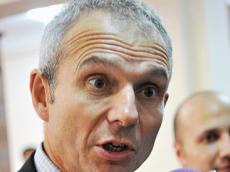|
|
TODAY.AZ / Politics
David Lidington : 'Way should be found way to solve Nagorno-Karabakh conflict'
24 April 2012 [10:33] - TODAY.AZ
 Nagorno-Karabakh problem is extremely important and it is necessary to
find a solution, the acting chairman of the Committee of Ministers of
the Council of Europe, a Briton, David Lidington said on the first
working day of the spring session of PACE.
Nagorno-Karabakh problem is extremely important and it is necessary to
find a solution, the acting chairman of the Committee of Ministers of
the Council of Europe, a Briton, David Lidington said on the first
working day of the spring session of PACE.The head of the Azerbaijani delegation Rafael Huseynov asked Lidington how exactly can CoE Committee of Ministers affect Armenia to resolve the Nagorno-Karabakh conflict.
Huseynov noted that there are a lot of IDPs and refugees, who are forced to lead a tragic life due to the Armenian aggression against Azerbaijan. "They have one simple request. They want the occupied territories of Azerbaijan to be liberated and to return to their own homes. And it is Armenia, which is more controlled from the outside and has failed to fulfill one of the basic obligations before CoE, who hinders the achievement of real results. In addition Armenia took the obligation to solve the problem peacefully 11 years ago when joining the Council of Europe. How exactly can CoE Committee of Ministers influence on Armenia to resolve the Nagorno-Karabakh conflict?", he asked.
Lidington said this issue should be raised each time, because the problem is very important and it is necessary to find ways to solve it.
"Indeed, it is OSCE Minsk Group who is directly charged with this problem. However, it is also related to the duties of the Council of Europe. Our duty is to create suitable conditions for reaching an agreement between the parties. Do not forget that Armenia and Azerbaijan were admitted into the CE and the commitment lies in the fact that the issue should be resolved peacefully. In my opinion, the Committee of Ministers should also exert maximum influence on the solution of the problem" he said.
The conflict between the two South Caucasus countries began in 1988 when Armenia made territorial claims against Azerbaijan. Armenian armed forces have occupied 20 percent of Azerbaijan since 1992, including the Nagorno-Karabakh region and 7 surrounding districts.
Azerbaijan and Armenia signed a ceasefire agreement in 1994. The co-chairs of the OSCE Minsk Group - Russia, France, and the U.S. - are currently holding the peace negotiations.
Armenia has not yet implemented the U.N. Security Council's four resolutions on the liberation of the Nagorno-Karabakh and the surrounding regions.
/Trend/
URL: http://www.today.az/news/politics/105902.html
 Print version
Print version
Views: 901
Connect with us. Get latest news and updates.
See Also
- 27 November 2025 [12:46]
President Ilham Aliyev attends opening of AZWOOL mineral stone wool plant - 27 November 2025 [11:11]
Western North–South route: logistics project reaches new level - 27 November 2025 [11:03]
Azerbaijan highlights expanding media partnerships across Turkic World - 27 November 2025 [08:00]
Azerbaijan, Italy mull ways of cooperation - 26 November 2025 [14:48]
Azerbaijan’s Deputy PM meets Russian counterpart to discuss bilateral cooperation - 26 November 2025 [12:12]
Pashinyan vs Etchmiadzin: Armenian PM wins the next round - 26 November 2025 [12:02]
Pakistan’s PM meets Azerbaijan’s Minister of Economy to discuss priority areas of bilateral cooperation - 26 November 2025 [11:11]
Pashinyan left Modi in broken trough - 25 November 2025 [18:22]
Armenia to skip upcoming CSTO summit in Bishkek - 25 November 2025 [15:40]
Sultan of Brunei Darussalam sends congratulatory letter to President Ilham Aliyev
Most Popular
 China invests in Azerbaijan: new investment direction
China invests in Azerbaijan: new investment direction
 Did you want "Azerbaijan next"? Choke on it! - A reminder to the Armenian revanchists
Did you want "Azerbaijan next"? Choke on it! - A reminder to the Armenian revanchists
 Culture Ministry moves heritage preservation services to electronic format
Culture Ministry moves heritage preservation services to electronic format
 Next 30–50 years of hydrocarbon projects demand new mindset, says bp executive
Next 30–50 years of hydrocarbon projects demand new mindset, says bp executive
 Kalbajar City Day marked with vibrant cultural events
Kalbajar City Day marked with vibrant cultural events
 Trump: Something good may be happening on Ukraine
Trump: Something good may be happening on Ukraine
 Milli Majlis to focus on visa agreements and core legal amendments
Milli Majlis to focus on visa agreements and core legal amendments
